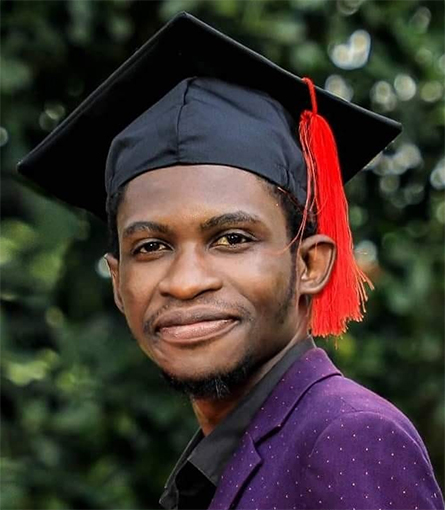
Diagnostics challenge medical inequities
When I was growing up in Zambia, I had a teacher who made biology very interesting. One day, he walked into our classroom said, “The cell is more complex than New York City at rush hour.”
This statement fueled my interest in biochemistry and molecular biology, and years later, in 2015, it motivated me to move to Uganda to earn a Bachelor of Science degree in biochemistry.

Muunda Mudenda now aims to help develop diagnostic technologies to improve
the quality of health care in Africa.
I now live in Kenya, where I am pursuing my master’s degree in molecular biology and biotechnology as a scholar with the Pan African University Institute for Basic Science, Technology and Innovation. The Pan African University scholarship, funded by the African Union through the African Development Bank with research funds contributed by the government of Japan, enables high-performing students to study for a master’s or Ph.D. at one of the PAU institutes in Kenya, Nigeria, Algeria, Cameroon and South Africa.
After I moved to Kenya in 2021, I began searching for a broader community of scientists committed to sharing their scholarly journeys in biochemistry and molecular biology. I found and joined the American Society for Biochemistry and Molecular Biology, making me one of the few ASBMB members in Kenya and Africa.
The ASBMB has given me an opportunity to be a part of a society that encourages young scientists to be high-value professionals. I’ve been exposed to materials through meetings, webinars and journals that have challenged my understanding of research in my field. I especially enjoy going through the ASBMB journals to learn about the trends in BMB research. The insights I get from these journals help me to add a relevant voice to scientific conversations here.
As a student researcher with the Kenya Medical Research Institute, I am carrying out a research project in vaccinology and adjuvants. My study involves the use of adjuvants to improve robustness of immune response to current vector-based COVID-19 vaccines. My hope is that we will be able to use molecular biology to contribute to the building of a technology platform for future end-to-end vaccine manufacturing in Kenya.
While my primary area of research is vaccinology, I am exposed constantly to other applications of biochemistry and molecular biology. Particularly important has been medical diagnostics — the application of biochemistry and molecular biology to improve diagnosis of diseases. Our laboratory also handles research projects that focus on developing diagnostic kits for diseases such as COVID-19, malaria and hepatitis.
Earlier this year, our laboratory worked on a rapid diagnostic kit for COVID-19. This project was very important because some remote areas of Kenya did not have sufficient COVID-19 testing kits, which made early detection of SARS-CoV-2 infections difficult. Being a part of a lab that develops such interesting medical technologies to solve real-world problems and improve management of diseases in Kenya has expanded my appreciation of biochemistry and molecular biology as applied in medical diagnostics research.
From my experience being involved in such projects, I think the growth of molecular diagnostics research in Kenya, and all of Africa, will help make diagnosis of diseases more accessible and affordable. Currently, high costs of medical diagnosis in Kenya, Uganda and Zambia have resulted is inequalities whereby only the well-to-do can afford diagnostic tools easily. I think advances in medical diagnostics can address such inequalities effectively.
Soon after my Master of Science degree, I hope to join a lab that develops and improves diagnostic technologies to improve the quality of health care in Africa.
Enjoy reading ASBMB Today?
Become a member to receive the print edition four times a year and the digital edition monthly.
Learn moreGet the latest from ASBMB Today
Enter your email address, and we’ll send you a weekly email with recent articles, interviews and more.
Latest in Opinions
Opinions highlights or most popular articles

Sketching, scribbling and scicomm
Graduate student Ari Paiz describes how her love of science and art blend to make her an effective science communicator.

Embrace your neurodivergence and flourish in college
This guide offers practical advice on setting yourself up for success — learn how to leverage campus resources, work with professors and embrace your strengths.

Survival tools for a neurodivergent brain in academia
Working in academia is hard, and being neurodivergent makes it harder. Here are a few tools that may help, from a Ph.D. student with ADHD.

Hidden strengths of an autistic scientist
Navigating the world of scientific research as an autistic scientist comes with unique challenges —microaggressions, communication hurdles and the constant pressure to conform to social norms, postbaccalaureate student Taylor Stolberg writes.

Black excellence in biotech: Shaping the future of an industry
This Black History Month, we highlight the impact of DEI initiatives, trailblazing scientists and industry leaders working to create a more inclusive and scientific community. Discover how you can be part of the movement.

Attend ASBMB’s career and education fair
Attending the ASBMB career and education fair is a great way to explore new opportunities, make valuable connections and gain insights into potential career paths.

